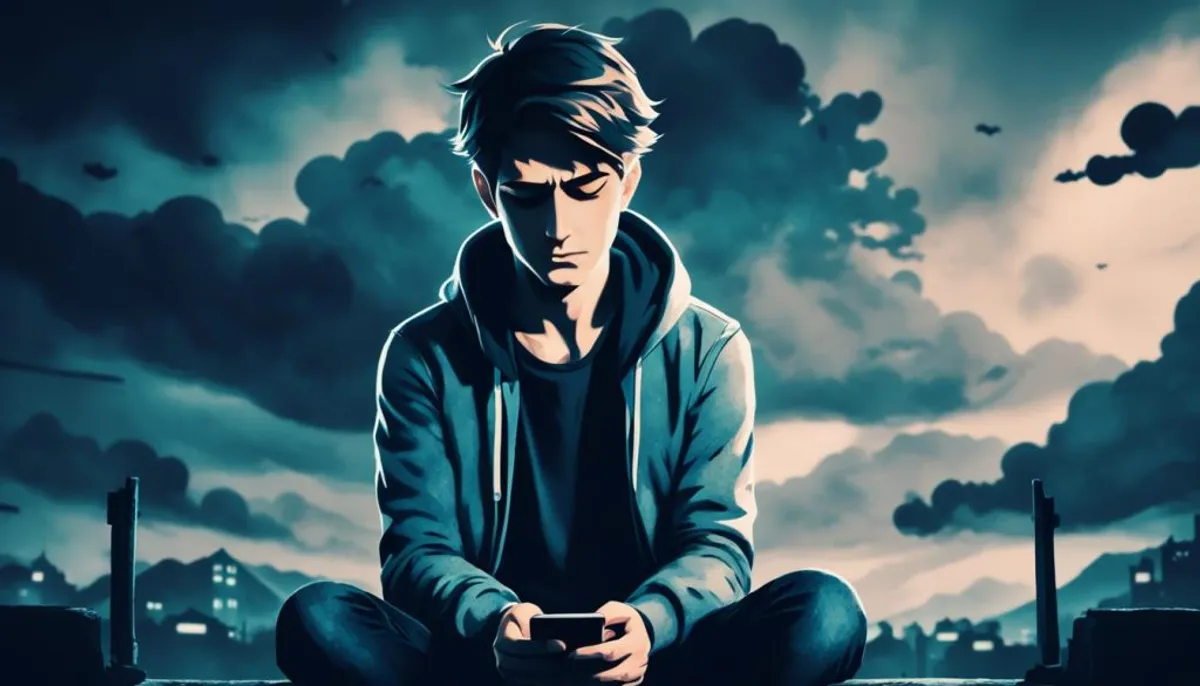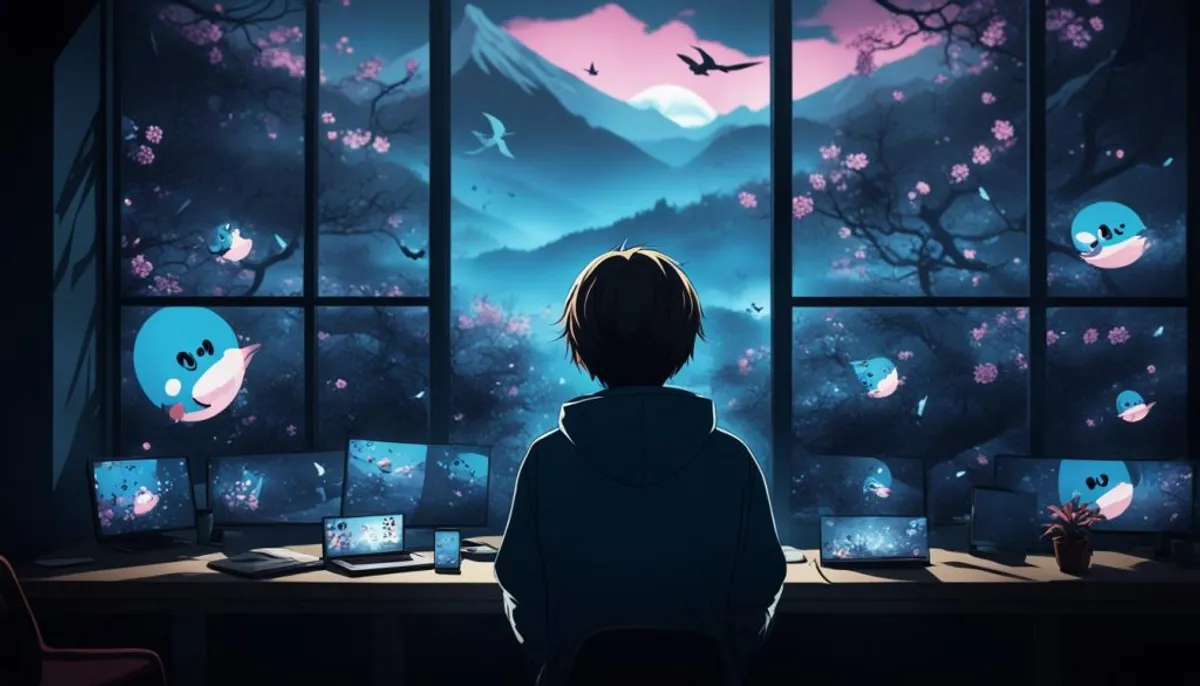Studies show that using social media can deeply affect our mental health, especially depression. Around 4 billion people use platforms like Facebook, TikTok, and Instagram. It’s crucial to know how these activities impact our well-being. This article looks into how social media relates to depression. It also gives tips for using social media in healthier ways.

Key Takeaways:
- Social media use has been associated with mental health issues, including depression and anxiety.
- Excessive social media use can contribute to sleep problems, feelings of loneliness, and decreased overall well-being.
- Research suggests that taking breaks from social media can lead to improvements in depression and anxiety.
- Comparing ourselves to others and fearing missing out (FOMO) can also impact mental health on social media.
- Teenagers are particularly vulnerable to the negative effects of social media on mental health.
The Impact of Social Media on Mental Health
Social media connects us to our family and friends. But, it can also harm our mental health. Research links it to depression and addiction.
Facebook, TikTok, and Instagram let us share and communicate. Yet, being online all the time can lead to mental health problems.
Too much social media can ruin our sleep. It leads to insomnia and poor sleep quality. Bad sleep can cause depression and anxiety.
Social media may make us feel lonely, even though it seems to connect us. Less face-to-face time means we might feel isolated. This emotional disconnect can make us sad and lonely.
“Taking breaks from social media can significantly reduce loneliness and depression.”
Studies show that taking social media breaks helps. It lets us live in the moment and improve relationships. People feel less depressed and anxious after a break.
Understanding how social media affects us is key. The wichita social media scene can have both positive and negative impacts. Too much of it can be bad for our health. By being mindful and taking breaks, we can have a healthier life with technology.
The Link Between Social Media Use and Depression
Research shows a positive association between social media use and mental health issues like depression. But, more research is needed to prove causality. Many studies rely on self-reported data and have small sample sizes.
Social media use is linked to cyberbullying, social pressure, comparison, addictive patterns, and the contagion effect of suicide. These factors can seriously affect mental health and lead to or worsen depression.
We need to recognize the possible negative effects social media has on mental health. Steps to mitigate its impact include being careful with how much time we spend on social media. We should set limits and ask for help if we need it.
| Factors | Impact on Mental Health |
|---|---|
| Cyberbullying | Increased risk of depression |
| Social Pressure | Feelings of inadequacy and low self-esteem |
| Comparison | Unrealistic expectations and decreased self-worth |
| Addictive Patterns | Compulsive behaviors and negative impact on mental well-being |
| Contagion Effect of Suicide | Increased risk of suicide ideation and behavior |
While social media can be good for staying in touch, sharing information, and making connections, we must watch how it affects our mental health. By knowing these risks and acting carefully, we can take care of our mental health and keep a healthy balance with social media. Understanding the best time to post insights can also help in managing our online presence effectively.
Social Media’s Impact on Sleep and Well-being
Research shows too much social media harms sleep and well-being. It can boost the risk of depression and anxiety.
Using social media a lot can affect sleep. Studies say it can cause insomnia and make sleep worse. The blue light and content make sleeping hard.
Not getting enough sleep can harm mental health. It affects thinking, feelings, and general mental well-being. Poor sleep can make stress worse and lead to depression and anxiety.

Also, social media can make people unhappy. However, it is important to recognize the positive effects of social media as well. Seeing perfect lives online makes users feel bad about themselves. They compare their lives to others and feel inadequate.
It’s important to watch how social media affects us. Limiting use, taking breaks before bed, and valuing real chat can help. These steps can improve sleep and mental health.
The Role of Social Comparison and FOMO
Social media sites can make us compare our lives to others. This may make us feel not good enough, hurting our self-esteem and diminishing our self-awareness. It might even lead to depression. We often want likes and comments to feel better, which keeps us stuck in this cycle.
FOMO, or the fear of missing out, is when we’re scared of being left behind. We see others having fun online and feel we’re missing out. This makes us think we’re not doing enough.
To feel better about social media, it’s key to know about social comparison and FOMO. We can take steps to manage it better. Here are some tips:
1. Mindful Social Media Use
Think about how social media makes you feel. Try to use it less if it makes you feel bad. This can help you stop comparing yourself to others too much.
2. Cultivate a Positive Online Environment
Stop following accounts that make you unhappy. Choose to follow ones that make you feel good instead. This can help you avoid an emotional disconnect and make your online time more enjoyable.
3. Focus on Authenticity
Remember, social media doesn’t show the full story. It’s often not real. Everyone has their own path, which is special.
4. Practice Self-Compassion
Be nice to yourself. Focus on what you’ve done and your own happiness. This is more important than any online comparison.
| The Role of Social Comparison | The Role of FOMO |
|---|---|
| Leads to feelings of inadequacy and low self-esteem | Creates anxiety about missing out on experiences |
| Drives the need for validation through likes and comments | Contributes to a constant sense of not doing enough |
| Can lead to depression and negative self-comparison | Causes a sense of urgency to constantly be connected |
By using social media wisely and knowing its effects, we can keep our minds healthy. This helps us enjoy social media without letting it hurt us, and is an important step in fostering community among teens.
The Impact of Social Media on Teens
Teenagers face the negative impacts of social media on mental health, including the social media impact on mental health. Social media can make feelings of anxiety, depression, and low self-esteem worse, especially for girls. This is because many teens use these platforms a lot.
Social media creates a false image of life. Teens see perfect lives online, which makes them expect too much from themselves and others. This can lead to body image issues and mental health problems during their important growing years.
Also, social media can lead to cyberbullying and feeling left out. The online world allows people to hurt others without showing their face. This can cause deep emotional hurt.
“Social media has created a culture where young people feel pressured to present a perfect version of themselves, which can lead to anxiety and depression. It’s important for parents and educators to understand the risks and help teenagers develop healthy habits in navigating social media platforms.”
Parents and educators are key in teaching teens about social media. By talking openly about its effects on mental health, they can help teens become stronger and think critically. This helps teens use social media wisely, including engaging in online learning via social media.
It’s important to find a good balance. Social media can be good for keeping in touch, finding information, and giving support. But, its bad effects on mental health must be reduced. Encouraging offline activities, self-care, and real friendships is helpful for teens’ well-being.
Digital literacy education
It’s key to teach teens about digital literacy. This means helping them understand the online world. Educators can add digital literacy to their teaching so students learn to think critically about online content. They can also learn about social media’s effects on mental health and make smart choices online.
Supporting mental health
Given social media’s impact, schools and communities should focus on mental health resources. They can offer counseling, awareness campaigns, and safe spaces for teens to talk. This can lessen social media’s bad effects.
| Positive Effects of Social Media | Negative Effects of Social Media |
|---|---|
| Enhanced communication and connectivity | Increased risk of cyberbullying |
| Access to information and educational resources | Inflated body image standards |
| Opportunities for self-expression and creativity | Reduced self-esteem and self-worth |
| Online support communities | Feelings of loneliness and social isolation |
| Exposure to diverse perspectives | Unrealistic portrayal of lifestyles |
Despite the potential risks associated with social media use, it’s important to remember that each individual’s experience may vary. Implementing strategies for healthy social media use, fostering offline connections, and prioritizing mental well-being can contribute to a more positive and balanced digital life for teenagers.
Benefits and Risks of Social Media Use
Social media plays a big role in our daily lives. It helps us talk easier, find information, and make new friends online. Additionally, there are positive effects of social media that can enhance our interactions and connections. Yet, too much social media can be bad for our mental health.
It’s great for keeping in touch, but it can also make us feel sad or alone. Looking at others’ perfect moments online can make us feel worse about our lives. It sets standards that aren’t real.
“Social media allows us to present the best version of ourselves, which can create unrealistic expectations and a distorted sense of reality.” – Dr. Jessica Stone, Psychiatrist
Social media can be addicting. We might feel like we always have to check our phones. This can make real-life talks harder and make us feel more alone.
But social media isn’t all bad. It lets us show who we are and meet people just like us. For instance, the zhihu question-and-answer platform is a great resource for finding groups that can help us with problems.
We should use social media in a smart way. This means enjoying the good parts and avoiding the bad. Here are some tips to do that:
- Only use social media at certain times. Don’t let it take over your day.
- Do fun things offline, like hobbies or hanging out with friends and family.
- Follow positive pages and people that make you happy.
- Think about how social media makes you feel. Stay away from stuff that upsets you.
- Look for friends and information that make you feel good, not for likes.
We all react differently to social media. It’s key to know what makes you feel good or bad. By using social media wisely, you can keep it from hurting your mental health.
| Benefits | Risks | |
|---|---|---|
| Communication | Instantly connect with friends and family across the globe. | Overreliance on digital communication can hinder face-to-face interactions. |
| Information Access | Stay updated on current events and access valuable resources. | Exposure to misinformation and negative content can impact mental well-being. |
| Social Support | Find support communities and connect with like-minded individuals. | Constant exposure to curated highlight reels can lead to comparison and feelings of inadequacy. |
We decide how to use social media. Making smart choices helps our mental health. By setting limits and choosing what makes us happy, we can enjoy social media safely. One effective way to enhance our learning experience is through online learning via social media.

Quote from a Social Media User:
“I’ve found immense support and friendship through the online mental health community. It’s been a lifeline for me during tough times.” – Sarah Thompson, social media user
Strategies for Healthy Social Media Use
To keep your mind healthy while using social media, follow these tips:
- Maintain Privacy: Adjust your social media settings for privacy. This lets you pick who sees your stuff. It makes you feel safe and keeps away bad online interactions.
- Set Limits: Make rules for how much you use social media. Maybe pick certain times to check it. This stops you from staring at screens too much. It helps you enjoy both online and real-life moments.
- Take Breaks: It’s good to step away from social media often. It lowers stress and the need to always be online. Take this time for yourself. Do things you love or spend time with family and friends.
- Seek Professional Help: If you’re feeling really down or stressed because of social media, talk to a professional. They know how to help and can give you advice that works just for you.
Using these ideas can make your social media experience better. It helps you care for your mental health.
Social Media and Mental Well-being
“Using these strategies, individuals can manage their social media use in a way that promotes mental health and overall well-being.”
The Role of Individuals in Social Media Change
Social media platforms can change to lessen the bad effects on mental health. But individuals also play a key role in how they use social media for recruitment. By keeping track of their actions, noticing what triggers them, and checking how they feel before and after using social media, people can see how it impacts them. Choosing carefully how to use social media and doing other fun activities can lead to a better balance.
Understanding how social media affects mental health starts with self-awareness. Paying attention to feelings and mental state helps people see the patterns. They can figure out if social media makes them feel good or bad, leading to things like addiction or sadness. Taking breaks from social media when it’s needed is important for checking its effect on mental health and adjusting how much they use it.
Setting limits on social media use is helpful. By creating boundaries, people can avoid using it too much and the bad effects of spending too much time on it. Having specific times for looking at social media and spending the rest of the day on activities that make them happy, like hobbies or being with family, can create a good balance.
People can also take action by making their social media feed more positive. Unfollow accounts that make them feel bad and follow ones that are about being positive and taking care of oneself. Joining supportive groups online and looking for helpful information can make social media use healthier.
In the end, people have the control to shape their social media use and its effects on their mental health. By taking care of themselves, being careful with their social media use, and looking for positive interactions, people can have a healthier relationship with social media. This includes addressing issues like miscommunication in relationships, which can arise from misunderstandings fostered by online interactions. Such awareness promotes their mental well-being.
Conclusion
Social media is a big part of our day-to-day life. Yet, it’s important to see how it can affect our mental health. Research is ongoing about how social media and depression are linked. But it’s clear that too much social media can be bad for our minds.
We need to start taking steps to use social media more wisely. It’s all about being aware of how much we’re on it. By doing so, we can fight the bad effects and make our tech use healthier.
FAQ
Do social media cause depression?
A: Research suggests a link between using social media and feeling depressed. However, we need more studies to understand this relationship fully.
What is the impact of social media on mental health?
Spending too much time on social media can lead to mental health problems, making digital footprint management crucial. This includes feelings of depression, anxiety, and even addiction.
Is there a link between social media use and depression?
Yes, there’s evidence that using social media and depression are connected. But, we need more information to know how they affect each other.
How does social media affect sleep and well-being?
Too much social media can cause sleep problems. This means you might not sleep well or enough, hurting your health and happiness.
What is the role of social comparison and FOMO in social media?
Social media makes people compare themselves to others, which can lead to social comparison and make them feel bad about themselves. The fear of missing out (FOMO) also plays a part in mental health problems from social media.
How does social media impact teenagers?
Teenagers face a high risk from the bad effects of social media. This includes more chances of feeling anxious, depressed, and experiencing cyberbullying.
What are the benefits and risks of social media use?
Social media can be good for keeping in touch, finding information, and getting support. Yet, it can also lead to mental health problems like depression and addiction, as well as miscommunication in relationships.
What are some strategies for healthy social media use?
Healthy use means changing your privacy settings, limiting your time online, taking breaks, and getting help if you feel overwhelmed.
What is the role of individuals in social media change?
People can help improve their social media habits. They can watch how much time they spend online, find triggers, and enjoy other activities.
Are social media a cause of depression?
Although we need more research, there’s a clear connection between too much social media and mental health issues like depression.
RelatedRelated articles



